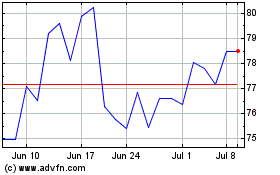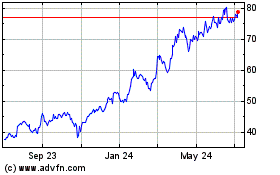A Chinese state-owned firm tasked with building the country's
semiconductor sector is retesting U.S. waters by buying a small
stake in a chip maker whose exports to China are restricted due to
their military applications.
Tsinghua Unigroup Ltd. said in a U.S. regulatory filing on
Wednesday that it has accumulated a roughly 6% stake in Portland,
Ore.-based Lattice Semiconductor Corp. through share purchases on
the open market. It comes after Tsinghua Unigroup made an
unsuccessful attempt last year to acquire U.S. memory-chip maker
Micron Technology Inc., according to people familiar with the
matter.
Lattice makes low-power programmable microprocessors that can be
customized to run high-tech systems such as data centers and
telecommunications networks, as well as military gear such as
missile guidance systems.
While Tsinghua's investment is modest at $41.6 million, it
suggests Chinese interest in this technology. China's recent
semiconductor investments have focused on more mainstream
technologies such as smartphone processors and flash memory chips,
as the country seeks to build a competitive chip sector.
China's leaders have promised as much as 1 trillion yuan, or up
to $154 billion, in funding for chip development and it has
encouraged companies like Tsinghua Unigroup to pursue overseas
investments.
For Tsinghua Unigroup, the Lattice investment appears to be a
test to see if a modest investment would be allowed without running
afoul of the Committee on Foreign Investment in the U.S. on
national security grounds. The committee, known as CFIUS, is
charged with determining whether any foreign acquisitions or
investments pose a security threat—and if it decides that it does,
the transaction could be blocked.
In a telephone interview Thursday, Tsinghua Unigroup Chairman
Zhao Weiguo said he didn't expect the investment would require
review due to the small stake size and the fact that Tsinghua
Unigroup isn't obtaining access to Lattice technology.
"This is purely a financial investment," he said. "We don't have
any intention at all to try to acquire Lattice."
Two larger U.S. investment attempts by Mr. Zhao last year were
derailed in part because of concerns about a potential review from
CFIUS. Tsinghua Unigroup's $23 billion attempt to acquire Micron
would have been the largest Chinese overseas takeover if it had
gone through. In February, the company also backed out of a $3.78
billion deal to invest in disk drive maker Western Digital Corp.,
citing a decision by U.S. authorities to investigate the
transaction on national security grounds.
CFIUS reviews cases when foreign entities buy control of a U.S.
business, and the threshold for control could be a small minority
stake, unless the acquirer is a passive investment fund.
The Treasury Department, which leads CFIUS, declines to comment
on cases that may be before the committee, citing confidentiality
rules.
U.S. officials have said they believe foreign companies are
working in coordinated fashion to acquire strategic U.S.
technology. People close to CFIUS have said officials are looking
closely at the sale of semiconductor assets, which have been
tightly monitored for decades.
Mr. Zhao said Tsinghua Unigroup may increase its stake or sell
it based on Lattice's performance. He said he hasn't been in
contact with Lattice executives, although he said he would be
interested in other partnerships with the U.S. company.
Lattice representatives didn't immediately respond to requests
for comment on Thursday.
It isn't the first time Chinese parties have taken interest in
Lattice. In 2011, the Federal Bureau of Investigation charged two
Chinese residents with setting up a fake company to circumvent U.S.
export restrictions to purchase Lattice chips. In the indictment,
prosecutors said that the two men sought to buy the military
version of a Lattice chip that could be used for applications such
as missile guidance and radar systems. The commercial version of
the chip could be used for tasks like controlling mining
equipment.
According to court records, those charges remain
outstanding.
Lattice is a smaller provider of an expensive type of chip
called a field-programmable gate array, or FPGA. Unlike regular
microprocessors, which are hard-wired during manufacturing, FPGAs
can be programmed by the end user. This niche chip market is
dominated by two other U.S. companies: Altera Corp., which was
acquired last year by Intel Corp., and Xilinx Inc.
The 2015 global market for FPGA chips was $4.4 billion according
to data from Gartner.
Mr. Zhao said Tsinghua Unigroup aims to break ground next year
in Shenzhen on a memory chip plant announced last year. Analysts
have questioned how the Chinese company will move forward with the
plant after the investment in Western Digital fell through, as
Tsinghua Unigroup doesn't itself have the know-how to make memory
chips.
Mr. Zhao said his company now has a team of 200 researchers to
develop dynamic random access memory chips, after acquiring another
Chinese chip maker, Tongfang Guoxin Electronics Co., last year.
DRAM chips are widely used in personal computers.
The Lattice investment shows a strategic shift at Tsinghua
Unigroup after several unsuccessful overseas acquisition attempts
last year, said Mark Li, an analyst at Bernstein Research. The
company is now taking a more cautious, longer-term approach to
investment, he said.
"They are trying to be more careful, more discreet," Mr. Li
said.
The global FPGA market is niche compared to other types of
semiconductors like microprocessors and memory chips, but it
commands high margins, he said.
William Mauldin, Robert McMillan and Kate O'Keeffe contributed
to this article.
Write to Eva Dou at eva.dou@wsj.com
(END) Dow Jones Newswires
April 14, 2016 13:55 ET (17:55 GMT)
Copyright (c) 2016 Dow Jones & Company, Inc.
Western Digital (NASDAQ:WDC)
Historical Stock Chart
From Mar 2024 to Apr 2024

Western Digital (NASDAQ:WDC)
Historical Stock Chart
From Apr 2023 to Apr 2024
